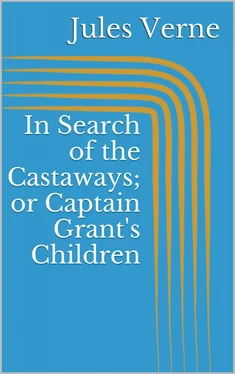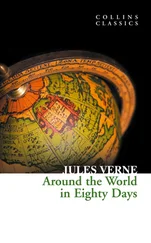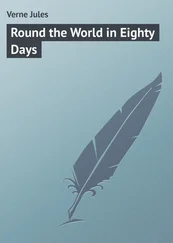Glenarvan, an experienced traveler, who knew how to adapt himself to the customs of other countries, adopted the Chilian costume for himself and his whole party. Paganel and Robert, both alike children, though of different growth, were wild with delight as they inserted their heads in the national PONCHO, an immense plaid with a hole in center, and their legs in high leather boots. The mules were richly caparisoned, with the Arab bit in their mouths, and long reins of plaited leather, which served as a whip; the headstall of the bridle was decorated with metal ornaments, and the ALFORJAS, double sacks of gay colored linen, containing the day's provisions. Paganel, DISTRAIT as usual, was flung several times before he succeeded in bestriding his good steed, but once in the saddle, his inseparable telescope on his shoulder-belt, he held on well enough, keeping his feet fast in the stirrups, and trusting entirely to the sagacity of his beast. As for Robert, his first attempt at mounting was successful, and proved that he had the making in him of an excellent horseman.
The weather was splendid when they started, the sky a deep cloudless blue, and yet the atmosphere so tempered by the sea breezes as to prevent any feeling of oppressive heat. They marched rapidly along the winding shore of the bay of Talcahuano, in order to gain the extremity of the parallel, thirty miles south. No one spoke much the first day, for the smoke of the DUNCAN was still visible on the horizon, and the pain of parting too keenly felt. Paganel talked to himself in Spanish, asking and answering questions.
The CATAPEZ, moreover, was a taciturn man naturally, and had not been rendered loquacious by his calling. He hardly spoke to his PEONS. They understood their duties perfectly. If one of the mules stopped, they urged it on with a guttural cry, and if that proved unavailing, a good-sized pebble, thrown with unerring aim, soon cured the animal's obstinacy. If a strap got loose, or a rein fell, a PEON came forward instantly, and throwing off his poncho, flung it over his beast's head till the accident was repaired and the march resumed.
The custom of the muleteers is to start immediately after breakfast, about eight o'clock, and not to stop till they camp for the night, about 4 P. M. Glenarvan fell in with the practice, and the first halt was just as they arrived at Arauco, situated at the very extremity of the bay. To find the extremity of the 37th degree of latitude, they would have required to proceed as far as the Bay of Carnero, twenty miles further. But the agents of Glenarvan had already scoured that part of the coast, and to repeat the exploration would have been useless. It was, therefore, decided that Arauco should be the point of departure, and they should keep on from there toward the east in a straight line.
Since the weather was so favorable, and the whole party, even Robert, were in perfect health, and altogether the journey had commenced under such favorable auspices, it was deemed advisable to push forward as quickly as possible. Accordingly, the next day they marched 35 miles or more, and encamped at nightfall on the banks of Rio Biobio. The country still presented the same fertile aspect, and abounded in flowers, but animals of any sort only came in sight occasionally, and there were no birds visible, except a solitary heron or owl, and a thrush or grebe, flying from the falcon. Human beings there were none, not a native appeared; not even one of the GUASSOS, the degenerate offspring of Indians and Spaniards, dashed across the plain like a shadow, his flying steed dripping with blood from the cruel thrusts inflicted by the gigantic spurs of his master's naked feet. It was absolutely impossible to make inquiries when there was no one to address, and Lord Glenarvan came to the conclusion that Captain Grant must have been dragged right over the Andes into the Pampas, and that it would be useless to search for him elsewhere. The only thing to be done was to wait patiently and press forward with all the speed in their power.
On the 17th they set out in the usual line of march, a line which it was hard work for Robert to keep, his ardor constantly compelled him to get ahead of the MADRINA, to the great despair of his mule. Nothing but a sharp recall from Glenarvan kept the boy in proper order.
The country now became more diversified, and the rising ground indicated their approach to a mountainous district. Rivers were more numerous, and came rushing noisily down the slopes. Paganel consulted his maps, and when he found any of those streams not marked, which often happened, all the fire of a geographer burned in his veins, and he would exclaim, with a charming air of vexation:
"A river which hasn't a name is like having no civil standing. It has no existence in the eye of geographical law."
He christened them forthwith, without the least hesitation, and marked them down on the map, qualifying them with the most high-sounding adjectives he could find in the Spanish language.
"What a language!" he said. "How full and sonorous it is! It is like the metal church bells are made of—composed of seventy-eight parts of copper and twenty-two of tin."
"But, I say, do you make any progress in it?" asked Glenarvan.
"Most certainly, my dear Lord. Ah, if it wasn't the accent, that wretched accent!"
And for want of better work, Paganel whiled away the time along the road by practising the difficulties in pronunciation, repeating all the break-jaw words he could, though still making geographical observations. Any question about the country that Glenarvan might ask the CATAPEZ was sure to be answered by the learned Frenchman before he could reply, to the great astonishment of the guide, who gazed at him in bewilderment.
About two o'clock that same day they came to a cross road, and naturally enough Glenarvan inquired the name of it.
"It is the route from Yumbel to Los Angeles," said Paganel.
Glenarvan looked at the CATAPEZ, who replied:
"Quite right."
And then, turning toward the geographer, he added:
"You have traveled in these parts before, sir?"
"Oh, yes," said Paganel, quite gravely.
"On a mule?"
"No, in an easy chair."
The CATAPEZ could not make him out, but shrugged his shoulders and resumed his post at the head of the party.
At five in the evening they stopped in a gorge of no great depth, some miles above the little town of Loja, and encamped for the night at the foot of the Sierras, the first steppes of the great Cordilleras.
Chapter XII.
Eleven Thousand Feet Aloft
NOTHING of importance had occurred hitherto in the passage through Chili; but all the obstacles and difficulties incident to a mountain journey were about to crowd on the travelers now.
One important question had first to be settled. Which pass would take them over the Andes, and yet not be out of their fixed route?
On questioning the CATAPEZ on the subject, he replied:
"There are only two practicable passes that I know of in this part of the Cordilleras."
"The pass of Arica is one undoubtedly discovered by Valdivia Mendoze," said Paganel.
"Just so."
"And that of Villarica is the other."
"Precisely."
"Well, my good fellow, both these passes have only one fault; they take us too far out of our route, either north or south."
"Have you no other to propose?" asked the Major.
"Certainly," replied Paganel. "There is the pass of Antuco, on the slope of the volcano, in latitude, 37 degrees 30' , or, in other words, only half a degree out of our way."
"That would do, but are you acquainted with this pass of Antuco, CATAPEZ?" said Glenarvan.
"Yes, your Lordship, I have been through it, but I did not mention it, as no one goes that way but the Indian shepherds with the herds of cattle."
"Oh, very well; if mares and sheep and oxen can go that way, we can, so let's start at once."
Читать дальше












